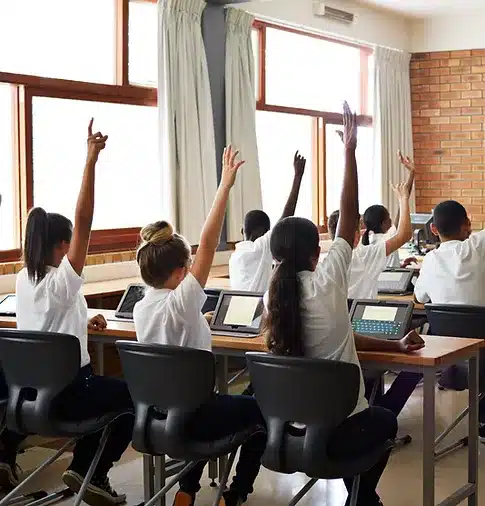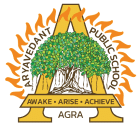
Learning
Aryavedant Public School CBSE Schools
The best part of student life can vary greatly depending on the individual. Some people may enjoy the social aspect of being a student, such as making new friends and participating in extracurricular activities. Others may enjoy the freedom and independence that comes with being a student.
Still others may enjoy the opportunity to learn and grow, both personally and academically. Ultimately, the best part of student life is different for everyone

CURRICULAM & SUBJECTS

Online App
Based Leaning
Interactive Learning where students can partake in quizzes and other interactive activities that ensure their continuous growth.
They can watch live and recorded classes, submit assessments and clarify doubts.
Parents can directly monitor and assess and celebrate their child’s learnings and achievements through their mobile.
English

Every concept is taught using the 5 Cs approach.
Contextual
All concepts are taught using the language pictures and examples that are relevant to you.
Concentric
All learning moves from teacher- led to student-led.
Connected to previous learning
You will build new knowledge on your existing knowledge.
Connected to life
You will be able to connect and apply your knowledge to life.
Caters to All learners
You have multiple Pathways to learn the concepts – videos activities and projects.
The 5 deeply connected components of English language and general awareness together Build strong English language skill.
Reading and Listening Comprehension
Students use strategies and structure to read new text and watch videos Independently with understanding. This builds strong thinking skills.
Grammar
Grammar Covers the rules and principles of English Students use it to write and speak better.
Whole words
Help Students learn sight words and new words. This component covers strategies to guess meanings of new words and make students independent reader.
General awareness
Common unit themes build general knowledge and values.
Writing and speaking expression
We motivate the students to use strategies and structure to express their thoughts in writing and speaking independently. English reader contains fiction and non-fiction texts for students to read and practice the skills of fluent reading and understanding.
The purpose is not to remember the story, poem, or passage retelling. The purpose is to build independent ability to read and comprehend. Students should be encouraged to read the English language and general aware reader repeatedly. This will help them gain familiarity with English language, build vocabulary and develop a love for reading.
We encourage the parents to read the stories, poem and passages from reader to their children at home.
At Aryavedant Public school we practice a comprehensive approach to phonics teaching.
Phonics is a crucial component of early literacy instruction, focusing on the relationship between sounds and letters. Following steps are followed at Aryavedant Public school to teach phonices:
Sequential Instruction
We introduce phonics skills in a logical, sequential order. Begin with basic letter-sound correspondences before progressing to more complex concepts. Start with consonant-vowel-consonant (CVC) words and then move on to blends, digraphs, and other phonics patterns.
Multisensory Techniques
students at Aryavedant engaged multiple senses in the learning process. Students apply hands-on activities, games, and manipulatives to reinforce letter-sound associations.
Incorporate activities that involve seeing, hearing, and touching, such as using letter cards, sandpaper letters, or magnetic letters, sand writing.
Phonemic Awareness
We develop phonemic awareness alongside phonics. Phonemic awareness involves recognizing and manipulating individual sounds in spoken words.
Practice activities such as segmenting, blending, and manipulating sounds orally before connecting them to written symbols.
Word Families
We introduce word families to help students recognize common patterns in words. This approach encourages students to generalize phonics rules to a broader set of words.
Explore rhyming words and emphasize the similarities in word endings.
Integration with Reading and Writing
Integrate phonics instruction with reading and writing activities. Encourage students to apply their phonics knowledge when reading and spelling words. Students connect phonics lessons to meaningful, authentic literacy experiences.
Assessment and Monitoring
Regularly we assess students’ phonics skills to identify areas of strength and areas that need further instruction.
Interactive Games and Activities
We use interactive games and activities to make phonics learning fun and engaging. Games like bingo, word sorts, and phonics board games reinforce skills in an enjoyable way.
Maths
We have designed our curriculum with the aim to help children get over the fear of Math and build deep conceptual clarity of the subject. Teaching mathematics effectively requires a combination of approaches to engage students, foster understanding, and promote critical thinking. Here are some methods and strategies for teaching math:

The learning approach is called concreate, pictorial and Abstract (CPA)method. The CPA method is a sequential process that begins students using physical objects (concreate) to understand quantities and operations with pictures(pictorial).
Concreate
Using real objects helps them to see and feel Math.
Pictorial
Pictures shown in the videos and books. Drawing helps them take the intermediate step from concreate to abstract.
Abstract
Use symbols to represent the pictures and learn the language of Math. Concreate and drawn pictures help them understand the quantity and operations behind the symbols.
Hands-On Learning
Here at Aryavedant we use manipulatives, such as blocks, counters, or geometric shapes, to make abstract concepts more tangible.Conduct practical activities and experiments that demonstrate mathematical principles.
Real-World Applications
Mathematical concepts are related to real-life situations to show their relevance to explore how math is used in various professions and everyday activities.
Visual Aids and Technology
We incorporate visual aids like graphs, charts, and diagrams to enhance understanding. Utilize technology, such as interactive whiteboards, educational apps, and online simulations, to make learning more engaging.
Problem-Solving Approach
We emphasize problem-solving skills to encourage critical thinking. Present open-ended problems that require students to apply mathematical concepts in different ways.
Collaborative Learning
We foster a collaborative learning environment where students work together on math problems and projects. Students are encouraged for discussions and peer teaching to reinforce understanding.
Differentiated Instruction
Here at Aryavedant we recognize and accommodate diverse learning styles and paces within the classroom and provide additional challenges for advanced students and additional support for those who need it.
Inquiry-Based Learning
We provide sufficient time to prompt students to explore and discover mathematical principles on their own and encourage curiosity and a sense of inquiry.
Assessment for Learning
Formative assessments is used to gauge students' understanding throughout the learning process. It helps to provide constructive feedback and adjust teaching strategies based on assessment results.
Real-Time Feedback
We provide immediate feedback during class activities to guide students and address misconceptions promptly.
A combination of these methods tailored to the specific needs and preferences of the students can contribute to a more effective and enjoyable math learning experience.
@home learning companion, it includes daily i-homework, in-app test, engaging activities. It provides access to a world of learning resources that give you an unmatched learning experience @home.
EVS

Practical
Students gain first-hand understanding of concepts through exploring, experimenting and observing things around them.
Connection to Real-Life
Students develop thinking skills and application of their learning in real-life situation for better understanding of concepts.
Social Studies
Aryavedant Public School Integrates multimedia resources, documentaries, and technology to make Social studies lessons more engaging. Virtual field trips, online simulations, and interactive presentations enhance the learning experience. We practice the following approaches-

Visualise
Images, videos, timelines, and graphic organisers are used to help students create mental images of an event, time, or place. This helps them in understanding and retaining the concepts better.
Locate
Maps and timelines are widely used by students to locate where and when a given event took place and provide context.
Connect
Students are encouraged to think outside the box and make connections to their life using the concepts being taught.
Incorporating Current Events
Keeping the curriculum up-to-date with current environmental issues and events helps students understand the relevance of their studies. It also encourages them to stay informed about global and local environmental issues.
Interdisciplinary Approach
Social Studies is inherently interdisciplinary, covering aspects of science, social studies, geography, economics, and more. At Aryavedant, teachers often integrate various subjects to provide a holistic understanding of environmental issues.
Experiential Learning
We facilitate hands-on experiences, field trips, and practical activities are crucial in Social studies education. Students benefit from direct interaction with the environment, conducting experiments, and exploring nature to enhance their understanding of concepts.
Local Context Emphasis
At Aryavedant Teachers focuses on local environmental issues and challenges. This approach helps students connect theoretical concepts to real-life situations in their community, fostering a sense of responsibility and engagement.
Project-Based Learning
We assign projects related to environmental issues encourage students to conduct research, collaborate, and present their findings. This approach promotes critical thinking and problem-solving skills.
Discussion and Debate
At Aryavedant Social studies classes get benefit from open discussions and debates. We Encourage students to express their opinions and engage in respectful debates fosters critical thinking and communication skills.
Civic Engagement
We include promoting environmental stewardship and civic responsibility. Encouraging students to participate in community projects, conservation efforts, or environmental awareness campaigns instill a sense of responsibility towards the environment.
Assessment through Multiple Methods:
We assess students' understanding of Social Studies beyond traditional exams. Portfolios, presentations, group projects, and other assessment methods can provide a more comprehensive evaluation of their knowledge and skills.
Global Perspective
While local context is important, Social Studies also provide a global perspective on environmental issues. Understanding the interconnectedness of environmental challenges globally help students to develop a broader worldview.
Ultimately, an effective teaching approach at Aryavedant Public School balances theoretical knowledge with practical experiences, encourages critical thinking, and fosters a sense of environmental responsibility among students.
CCS

Connect to Real Life
Projects in the CCS curriculum integrate computers with concepts from real-life and other subjects. For example, a Grade 3 student builds games such as Maze games on Scratch Jr.
Use-Think-Build
In each unit, students learn how to USE applications, THINK logically using algorithms and BUILD apps, games, websites, visualisations, and animations.
Project Based
Students are given projects to promote competition and sense of completion and success.
Connection to Real-Life
Students start at their current skill level and accelerate to the respective grade level in one year regardless of prior experience in the discipline.
Coding and computational thinking are set to become core life skills in the future just as literacy and numeracy are today. Most advanced countries have included coding as a part of the core curriculum and NEP 2020 clearly sets out the road map for the Indian education system as well. Here at Aryavedant Public School, the coding and computational skills program follows a unique USE, THINK, BUILD(UTB) pedagogical approach.
The first step in the UTB approach is to take the students throw animals experience that introduce them to their project. Students use apps games website and visualization and engage with audio visual content. This helps them obtain the perspective and news experience of what they would be creating through their project.
The second step in the UTB approach is to make student thing. Through Independent and group activities and routine students learn to understand the computational thinking and logic that is required to build their project this keypad understanding helps them developed skills like observation and decision making.
The third and final step in UTB approach is to make a students built the project puzzles, art work, publications animations or websites students use appropriate easy to use software and applications to bring the ideas to life. The ability to build, code, show case there project is essential to not sharing creativity and expressing their ideas
FAQ
(Common Question)
Looking for more information in a concise manner? Read commonly asked questions in our FAQ section. Send us an email or call us if you still have queries.
Admission Rules
- No pupil will be admitted without a Transfer Certificate from the school last attended.
- Students from U.P. Board seeking admission for classes VI and above must have their Transfer Certificates, countersigned by education authorities.
- The Transfer Certificate of a pupil coming from outside Uttar Pradesh must be countersigned by proper authorities irrespective of the class into which admission is sought.
- A pupil seeking admission must produce his Date of Birth Certificate issued by the municipal authorities along with his Transfer Certificate.
- Admission is given on the basis of Entrance Test and on the availability of seats.
- Irrespective of the time of admission, fee will be charged from the beginning of the academic session.
- No pupil will be admitted in any class higher than that for which the Transfer Certificate shows him to be qualified, nor will he be granted out of turn promotions.
School Rules - For Students
Students are ambassadors of ARYAVEDANT
- Students must wear the School Uniform and be neatly dressed on each single day
- They must be punctual, courteous, helpful and disciplined in and outside School.
- Students should carry their ALMANAC to the school every day with his/her photograph duly pasted and the student person record should be signed by the parents.
- They should show respect for school property and take care not to damage it in anyway. Damage done even by accident should be reported at once to the school authorities.
- Students are encouraged to speak in English while in the school Campus & in the Bus.
- Nail polish, expensive jewelry, mehndi, tattoos and fancy bands are not permitted in School.
- No bullying, beating or using abusive language of any sort will be tolerated.
- Tablets or other Electronic Gadgets are not allowed in School. (Unless specifically required by Teachers for presentations etc, for which prior written permission of the Teacher concerned is required.)
- Students are not allowed to leave the school premises during School hours without an Out pass signed by the Class Teacher/Vice Principal.
- No books (other than textbook or library books), magazines or papers should be brought to school.
- Students should treat the Teacher and the non-teaching staff with respect.
- Students must obey the school rules. Disciplinary action will be taken for any objectionable conduct in and outside school.
- Office bearers (council members/house appointments/monitor) will wear their respected badges daily.
- No students will be allowed to leave the school premises within school hours and on test/exam days. In case of absence on any ground retest will not be conducted.
School Rules - For Parents
- The Parents are expected to support the Principal, Teachers and administrative staff for the decisions taken by them in the best interests of their Child. Must ensure that your child comes to school on time and is smartly dressed in proper school uniform.
- Maintain an atmosphere at home in which your Child can do quality Home Study and complete School assignments etc.
- Private tuitions are discouraged by the school. No Student will take coaching from the Teachers of AVPS.
- Pay the School Fees before the due date in order to avoid fines and the inconvenience caused both for you and us.
- Suggestions/Complaints, if any can be made to the principal on all working Saturdays during School hours with prior appointment from the School Reception.
- A special meeting with a teacher can only be arranged with prior intimation and permission from the reception.
- Absence for six consecutive days without an application renders a student’s liable to having his name struck off the rolls without any notice. Re-admission may be granted after payment of fresh admission fees on the direction of the principal.
- Please attend all PTMs as well as the other School Functions regularly and punctually.
- The school reserves the right to suspend or take strict disciplinary action against the student whose conduct is harmful to other students.
- Parents are expected to have courteous and supportive behaviour towards School.
- Once a child has come to school, he/she should not be asked to go on half day or to take leave from any period, unless there is an emergency and only authorized person will be allowed to take the child home.
- The lunchbox should be sent with the students.
NOTE: In order to allow the school to run in a disciplined manner, ask your child to be energetic, dynamic and well dressed. In case your child is not able to come to School for any reason do not forget to put a message via Email or ERP.
Classroom Rules
- Be punctual and regular.
- Converse in English all the times.
- Keep your classroom neat and clean.
- Maintain discipline all the time and don’t move out of the classroom without the teacher’s permission.
- Changing of classrooms between periods should be done in an orderly manner and silently.
- Eat your tiffin in the classroom during lunch break. A napkin, table mat, spoon/fork should be brought daily.
- Refrain from indiscipline in the corridors or classrooms.
- Contribute to the soft board and class displays.
- Bring books and notebooks according to the timetable.
- All notebooks and books should be neatly labelled and covered. Only prescribed notebooks to be used.
- Notebook work should be neat. Only HB pencils/gel pens/ink pens to be used. Whiteners and mechanical pencils are not permitted.
- Handouts to be pasted in the notebooks, as instructed.
- Make sure to complete the work missed due to absence.

